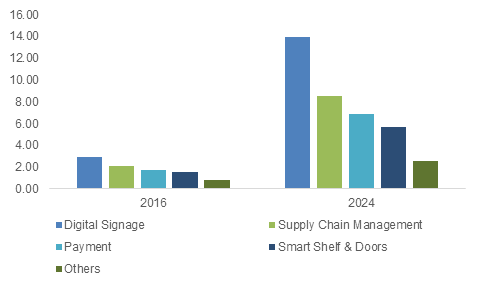RFID technology to boost IoT in retail market, software-based solutions to witness lucrative demand over 2017-2024
Publisher : Fractovia | Published Date : 2017-10-05Request Sample
The scope for IoT in retail market has been growing at an exponential pace, subject to the surging adoption of IoT solutions by retailers to enhance consumer shopping experience. It has been a general observation that retailers face humongous problems while retuning apparel, however, with the introduction of IoT, these challenges have been significantly resolved. Retailers have been leaning toward IoT a great deal lately, in a bid to maintain a balance between consumer convenience and legal policy, which would eventually stimulate IoT retail industry trends. The deployment of IoT solutions provides immense benefits to retailers – it helps reduce theft, enables precise inventory management, enhances store operations, and ensures purchases through cross selling. A recent instance demonstrating the proliferation of IoT retail market is that of European retailers adopting RFID tag chips to ensure consumer privacy while purchasing tagged items from the store. As per statistics, IoT in retail market generated a revenue of USD 9 billion in the year 2016.
IoT in retail market, by application, 2016 & 2024 (USD Billion)

IoT, in recent times, has been helping brick-and-mortar stores to combat effectively with online shopkeepers to attract more customers and revamp their business. Major players that are encompassed by IoT in retail market are focusing on development of advanced products that not only ease the shopping process, but also provide an elevated level of privacy to consumers. For instance, RAIN RFID solution company, Imping has developed an RFID tag chip, which provides significant privacy settings for retailers across Europe. This effort has been lauded to be rather commendable, and may have a proportional effect on the regional IoT retail market share. Besides, the government authorized regulatory organizations have also been mandating some norms to provide security to consumers. In fact, European Commission mandates that retailers implementing the RFID technology should deploy Privacy Impact Assessment (PIA) for every application. The efforts undertaken by regulatory bodies would also have a rather noteworthy impact on IoT in retail industry.
Microsoft Corporation, Cisco Systems, Intel Corporation Inc., Zebra Technologies, IBM Corporation, and SAP are some of the renowned players in IoT retail industry. Intel® in fact, has recently developed IoT Platform solutions to enable inventory accuracy for supporting omni-channel solutions in the retail space. Retailers have been increasingly using this service for end-to-end analytics, high operational efficiency, and inventory accuracy. The implementation of IoT also reduces the product carry cost to a considerable extent, which would prove rather beneficial for retailers. Speaking along similar lines, the development and advent of IoT and the surging use of mobile devices, would thus undeniably stimulate IoT in retail market size.
Recently, tabloids were afloat with the news of Ocado, the online grocery retailer, becoming the first supermarket in the UK to unveil an application for voice control personal assistance. The Ocado Technology team has built an artificial intelligence (AI) based service to understand consumer preferences, to sort out the issues related to previously bought apparels and items.
Apart from online retail applications, IoT is primarily used by retailers for connected consumers, supply chain, and smart stores applications. For instance, in order to monitor the entire shopping experience, several retailers have been developing smart stores incorporated with IoT. Prior to its deployment, retailers would spend more on survey projects to keep abreast of consumer interests. Now with the advent of smart stores, retailers can monitor customers demographics through Wi-Fi foot traffic or video monitoring. This would eventually help shopkeepers to adjust the store layout to increase number of customer visits, which will boost IoT in retail industry size. In addition to this, the deployment of IoT services is overt to support digital marketing in the stores as well.
The advent of smart phones, tablets, and mobiles have had a positive impact on IoT in retail market size so far. Retailers have been massively adopting mobile based applications, through which they can endorse their promotional offers and location based services. IoT thus helps retailers directly connect with customers, which is slated to stimulate the IoT retail market outlook over the years ahead.
In a bid to enable smart transportation, many merchants have been focusing on deploying IoT solutions, for ensuring accurate product tracking, transport maintenance, and route optimization. Taking into account the high degree of accuracy required for route tracking, suppliers have also been increasingly giving preference to smart transport, which will favorably boost IoT retail industry. Estimates in fact, forecast this business space to reach commendable heights in the years ahead – as per analysts, IoT in retail market size is likely to be pegged at USD 30 billion by 2024.